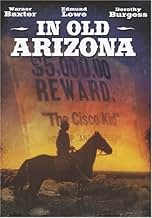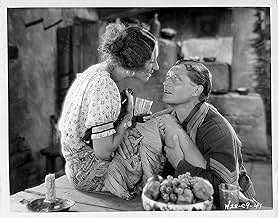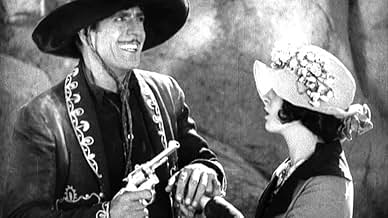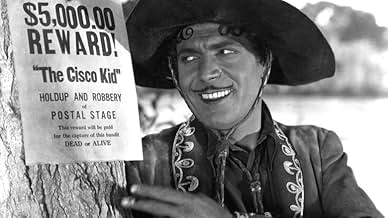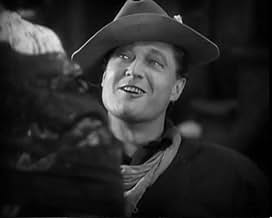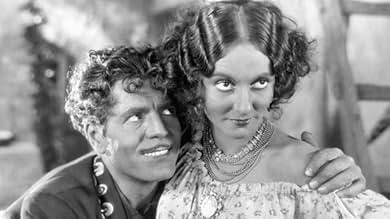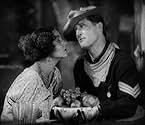IMDb रेटिंग
5.5/10
1.4 हज़ार
आपकी रेटिंग
अपनी भाषा में प्लॉट जोड़ेंA charming, happy-go-lucky bandit in old Arizona plays cat-and-mouse with the sheriff trying to catch him while he romances a local beauty.A charming, happy-go-lucky bandit in old Arizona plays cat-and-mouse with the sheriff trying to catch him while he romances a local beauty.A charming, happy-go-lucky bandit in old Arizona plays cat-and-mouse with the sheriff trying to catch him while he romances a local beauty.
- 1 ऑस्कर जीते
- 4 जीत और कुल 4 नामांकन
Henry Armetta
- Barber
- (बिना क्रेडिट के)
James Bradbury Jr.
- Soldier
- (बिना क्रेडिट के)
Frank Campeau
- Man Chasing Cisco
- (बिना क्रेडिट के)
John Webb Dillion
- Second Soldier
- (बिना क्रेडिट के)
Alphonse Ethier
- Sheriff
- (बिना क्रेडिट के)
Jim Farley
- Townsman
- (बिना क्रेडिट के)
William Gillis
- Guard
- (बिना क्रेडिट के)
Pat Hartigan
- Cowpuncher
- (बिना क्रेडिट के)
Soledad Jiménez
- Tonita the Cook
- (बिना क्रेडिट के)
Ivan Linow
- Russian Immigrant
- (बिना क्रेडिट के)
Tom London
- Man in Saloon
- (बिना क्रेडिट के)
Helen Lynch
- Stagecoach Passenger
- (बिना क्रेडिट के)
J. Farrell MacDonald
- Stage Passenger
- (बिना क्रेडिट के)
Julius Viggo Madsen
- Tenor in Quartet
- (बिना क्रेडिट के)
फ़ीचर्ड समीक्षाएं
This film has been of interest to me for some time now, for a number of reasons. I finally managed to get a copy and saw it yesterday. I now understand why it is not currently generally available-it is dated, of, at best, average quality, not without charm or appeal, to be sure, but the interst here is for a relatively small audience. Not a bad film, by any means, just not terribly engaging. I will say that a knowledge of Spanish greatly enhanced my own enjoyment of this film, as two or three very good lines were delivered in Spanish.
I have now seen three of the five Academy Award Picture nominees in their entirety (and am unlikely to ever see one, The Patriot, as it is reportedly a "lost" film) and part of Alibi. I now understand how Broadway Melody won that year. Of the choices I've seen, it is clearly the best of an average lot. The Patriot may well be better, but I'm unlikely to ever be able to judge that point.
I enjoyed the film, warts and all, but it is rather dated. But, for my money, any movie that gives the leading man the nickname, "El Conejito" (Little Rabbit) can't be too bad. Worth watching. Recommended to old film buffs and film historians.
I have now seen three of the five Academy Award Picture nominees in their entirety (and am unlikely to ever see one, The Patriot, as it is reportedly a "lost" film) and part of Alibi. I now understand how Broadway Melody won that year. Of the choices I've seen, it is clearly the best of an average lot. The Patriot may well be better, but I'm unlikely to ever be able to judge that point.
I enjoyed the film, warts and all, but it is rather dated. But, for my money, any movie that gives the leading man the nickname, "El Conejito" (Little Rabbit) can't be too bad. Worth watching. Recommended to old film buffs and film historians.
Although this film was released in January 1929, it was filmed in 1928. That makes it truly amazing when you think that the first all-talking picture wasn't even released until July 1928 - "Lights of New York". As others have mentioned, this film does not have lots of action - much screen time is spent with characters just talking in specific locations. There are no exciting shoot-outs or chases as you would expect in a western made just five years later. This is probably due to the motion constraint of the early sound cameras. However, you do get some tremendous long shots of some stunning western vistas. This was because Fox was an early adopter of sound-on-film versus sound-on-disc. This gave Fox the ability to shoot outside and made the studio an innovator in the production of newsreels - they could take their cameras anywhere.
As for the film itself, I'd recommend it only if you're interested in early sound films. Otherwise, you'll probably be bored stiff due to the lack of action. Warner Baxter's portrayal of the Cisco Kid is quite good. He doesn't get too campy with a role that could have been over-the-top in the wrong hands. I do have to wonder - why is every single member of the army that is pursuing Cisco speaking with a Queens accent and why are they using urban New York slang? Was there a mix-up at central casting that day? Was the cast of this film supposed to show up for a Bowery Boys film or a gangster picture and wound up here by mistake? In 1928 there were dialogue coaches, but probably not many coaches on regional dialect. It's a shame to think that if John Wayne had tried out for this early sound western he would have been turned down because he didn't sound like he was from Brooklyn.
As for the film itself, I'd recommend it only if you're interested in early sound films. Otherwise, you'll probably be bored stiff due to the lack of action. Warner Baxter's portrayal of the Cisco Kid is quite good. He doesn't get too campy with a role that could have been over-the-top in the wrong hands. I do have to wonder - why is every single member of the army that is pursuing Cisco speaking with a Queens accent and why are they using urban New York slang? Was there a mix-up at central casting that day? Was the cast of this film supposed to show up for a Bowery Boys film or a gangster picture and wound up here by mistake? In 1928 there were dialogue coaches, but probably not many coaches on regional dialect. It's a shame to think that if John Wayne had tried out for this early sound western he would have been turned down because he didn't sound like he was from Brooklyn.
IN OLD ARIZONA (Fox, 1928/29), directed by Irving Cummings and Raoul Walsh, marks the new beginning in motion picture history as the first all-talking western and the first with sound to be use actual location scenes to take advantage of the great outdoors rather than using indoor shots with rear projection passing for exteriors. With silent films still essential at the time of its release (January 1929), novelties such as this hearing actors speaking their lines rather than reading what they're saying through the use of inter-titles would soon put the silent films out to pasture. While not the first motion picture about the Cisco Kid, this was the start of a long series of westerns featuring the bandito as originated in O. Henry's short story, "The Caballero's Way," from which this movie was based. Anyone familiar with the 1950s TV series, "The Cisco Kid" starring Duncan Renaldo and Leo Carrillo, and expecting IN OLD ARIZONA to have Cisco and his sidekick Pancho saving the day, would be disappointed mainly because this Cisco Kid is more true to O'Henry's creation than the future films and television incarnations. The Cisco Kid is a bandit who works very much alone, being one step ahead of anyone out to claim their reward on his capture, dead or alive. "Oh Cisco! No Pancho!"
The story gets underway with passengers boarding the Gila Tombstone Stagecoach bound for its destination. This scene is followed by the introduction of the Cisco Kid (Warner Baxter) taking the wanted poster sign from a tree bearing his name with a $5,000 price on his head. After holding up the stagecoach, he goes on his way. Sergeant Mickey Dunn (Edmund Lowe) is assigned by his Commandant (Roy Stewart) to capture this bandit. During his mission, Mickey finds time flirting with various tough bar women, namely Tonia (Dorothy Burgess), who's not only Cisco's girl but girlfriend to every cowboy in town. Wanting to collect the reward on Cisco's capture, Tonia sets a trap on him, but Cisco has other plans for her once he discovers her true "loyalty" towards him.
IN OLD ARIZONA looks like a western, plays like a western, in fact, is a western, but doesn't have the pace more commonly found in westerns of subsequent eras. Being a primitive talkie, that's to be expected. The only musical backdrop presented is during opening credits and exit music, each to the fine and beautiful theme song, "My Tonia." Aside from the Cisco Kid serenading to Tonia, there are others singing to the tune to "Bicycle Built for Two," while Edmund Lowe's vocalizes "The Bowery" For this first western with sound, the audio use of church bells, the mooing of cows, the hoofs of running horses and gunshots appear to be more essential and beneficial than the action itself, which may be the reason why IN OLD ARIZONA is hardly revived, regardless of its then popularity and Academy Award nominations, including Best Picture. It's only known commercial television presentation was on a Hartford, Connecticut station, WFSB, Channel 3, in 1974.
As much as the Cisco Kid could have been enacted by natural born Hispanic actors as Antonio Moreno or Gilbert Roland (who later enacted the role in the 1940s), for example, the part went to Warner Baxter (his talking film debut), who won an best actor Academy Award for it. Baxter's accent and Mexican attire are believable, character acceptable, for that his achievement in a role not true to his background shows more effort than having an natural-born Mexican playing a Mexican. Whenever Baxter's Cisco is off screen for long intervals, and Mickey Dunn's involvement with saloon girls (one claiming "all men are bums"), taking too much screen time, the pace slows down considerably. Although Lowe's character weakens the film somewhat, especially with his portrayal being more to the liking of Sergeant Quirt, the role he originated so well in WHAT PRICE GLORY? (Fox, 1926), yet without Victor McLaglen as his counterpart, it misses something. Lowe does have a scene worth nothing, however, set in the barber shop where he is playing dice and conversing with barber Guiseppi (Henry Armetta) about wanting to meet up with the Cisco Kid, unaware that Cisco is sitting close by in the barber's chair with his face covered with a towel. Dunn and Cisco become acquainted before going on their separate ways. When Dunn discovers he shook hands with the man he's out to arrest, the noise made by a donkey is sounded behind him, making him feel like a "jack ass."
Dorothy Burgess (in movie debut), is fine as Tonia, whose performance makes one wonder how WHAT PRICE GLORY heroine Dolores Del Rio might have succeeded as the Mexican saloon girl if given to her, and a chance to be reunited with Edmund Lowe on screen again? Soledad Jimenez and J. Farrell MacDonald appear unbilled in smaller roles. Baxter reprized his role in THE CISCO KID (Fox, 1931) and again in THE RETURN OF THE CISCO KID (20th-Fox, 1939), which started the cycle of "Cisco Kid" program westerns with Cesar Romero taking over the role afterword's. After the series expired by 1942, the Cisco Kid was resurrected again in a whole new series for Monogram (1945-1948) and United Artists (1949-50) featuring Gilbert Roland and later Duncan Renaldo, who carried on his Cisco portrayal to television.
Having been fortunate to acquire a 2005 DVD copy of IN OLD ARIZONA is assuring to know that this western antique is readily available for film and western enthusiasts to view and study the movie that helped advance the career of Warner Baxter in an unlikely role as The Cisco Kid. (***)
The story gets underway with passengers boarding the Gila Tombstone Stagecoach bound for its destination. This scene is followed by the introduction of the Cisco Kid (Warner Baxter) taking the wanted poster sign from a tree bearing his name with a $5,000 price on his head. After holding up the stagecoach, he goes on his way. Sergeant Mickey Dunn (Edmund Lowe) is assigned by his Commandant (Roy Stewart) to capture this bandit. During his mission, Mickey finds time flirting with various tough bar women, namely Tonia (Dorothy Burgess), who's not only Cisco's girl but girlfriend to every cowboy in town. Wanting to collect the reward on Cisco's capture, Tonia sets a trap on him, but Cisco has other plans for her once he discovers her true "loyalty" towards him.
IN OLD ARIZONA looks like a western, plays like a western, in fact, is a western, but doesn't have the pace more commonly found in westerns of subsequent eras. Being a primitive talkie, that's to be expected. The only musical backdrop presented is during opening credits and exit music, each to the fine and beautiful theme song, "My Tonia." Aside from the Cisco Kid serenading to Tonia, there are others singing to the tune to "Bicycle Built for Two," while Edmund Lowe's vocalizes "The Bowery" For this first western with sound, the audio use of church bells, the mooing of cows, the hoofs of running horses and gunshots appear to be more essential and beneficial than the action itself, which may be the reason why IN OLD ARIZONA is hardly revived, regardless of its then popularity and Academy Award nominations, including Best Picture. It's only known commercial television presentation was on a Hartford, Connecticut station, WFSB, Channel 3, in 1974.
As much as the Cisco Kid could have been enacted by natural born Hispanic actors as Antonio Moreno or Gilbert Roland (who later enacted the role in the 1940s), for example, the part went to Warner Baxter (his talking film debut), who won an best actor Academy Award for it. Baxter's accent and Mexican attire are believable, character acceptable, for that his achievement in a role not true to his background shows more effort than having an natural-born Mexican playing a Mexican. Whenever Baxter's Cisco is off screen for long intervals, and Mickey Dunn's involvement with saloon girls (one claiming "all men are bums"), taking too much screen time, the pace slows down considerably. Although Lowe's character weakens the film somewhat, especially with his portrayal being more to the liking of Sergeant Quirt, the role he originated so well in WHAT PRICE GLORY? (Fox, 1926), yet without Victor McLaglen as his counterpart, it misses something. Lowe does have a scene worth nothing, however, set in the barber shop where he is playing dice and conversing with barber Guiseppi (Henry Armetta) about wanting to meet up with the Cisco Kid, unaware that Cisco is sitting close by in the barber's chair with his face covered with a towel. Dunn and Cisco become acquainted before going on their separate ways. When Dunn discovers he shook hands with the man he's out to arrest, the noise made by a donkey is sounded behind him, making him feel like a "jack ass."
Dorothy Burgess (in movie debut), is fine as Tonia, whose performance makes one wonder how WHAT PRICE GLORY heroine Dolores Del Rio might have succeeded as the Mexican saloon girl if given to her, and a chance to be reunited with Edmund Lowe on screen again? Soledad Jimenez and J. Farrell MacDonald appear unbilled in smaller roles. Baxter reprized his role in THE CISCO KID (Fox, 1931) and again in THE RETURN OF THE CISCO KID (20th-Fox, 1939), which started the cycle of "Cisco Kid" program westerns with Cesar Romero taking over the role afterword's. After the series expired by 1942, the Cisco Kid was resurrected again in a whole new series for Monogram (1945-1948) and United Artists (1949-50) featuring Gilbert Roland and later Duncan Renaldo, who carried on his Cisco portrayal to television.
Having been fortunate to acquire a 2005 DVD copy of IN OLD ARIZONA is assuring to know that this western antique is readily available for film and western enthusiasts to view and study the movie that helped advance the career of Warner Baxter in an unlikely role as The Cisco Kid. (***)
In Old Arizona made for Fox Films in 1928 has the distinction of being the first all sound film and by dint of that the first all sound western. Warner Baxter won the second Academy Award given out for Best Actor and In Old Arizona bringing to the screen that legendary Robin Hood of the West, The Cisco Kid.
This version of Cisco is a whole lot different than the show I remember as a lad. Duncan Renaldo was a gentlemen, a caballero in the full meaning of the word, ever ready to help anyone in distress. He was a Latino version of Hopalong Cassidy and Cisco and Hoppy had a revival of popularity in the early television days.
But both of those characters were far from what Clarence Mulford and William Sydney Porter wrote. Hoppy was a tobacco chewing rather profane cuss who worked on the Bar 20 ranch, not the kid's role model William Boyd made him. Similarly the Cisco Kid was a charming fellow even for a bandit. But he was a most unapologetic man about his profession.
For this film Baxter's Cisco is cleaned up somewhat, still though he exacts a terrible, but quite just vengeance for betrayal, something Duncan Renaldo never would have done.
Today with political correctness, a man like Warner Baxter never would have been cast as the Cisco Kid, let alone win an Oscar for the role. But Baxter went on to do Cisco in four more films before folks like Cesar Romero, Gilbert Roland and Duncan Renaldo took the character over. There's a reason for this, Warner Baxter did a superb job in the part. Though his accent is obviously fake, he in no way demeans Latinos with his portrayal.
Dorothy Burgess is Cisco's best girl, I say best because she's far from the only one. She's a girl with big ambitions though and a bandit's moll even for a guy as handsome and charming as Warner Baxter has its limits.
Cisco's reeking so much havoc in that country on the American side of the Rio Grande that the army has gotten into the act. With war with Spain imminent, Sergeant Edmund Lowe's been given an order, get Cisco dead or alive.
Lowe essentially brings his Sergeant Quirt persona to the part of New York born sergeant Mickey Dunn. He's about an inch too sure of himself and he too thinks he's best with the ladies.
In Old Arizona also got nominations for Best Picture, Best Director and it goes without saying Best Sound. Though it's ancient now, a lot of people thought the sound of those ham and eggs cooking on the stove for Cisco in Burgess's cabin was considered revolutionary in 1928.
I recommend it highly especially for the ending. As another Latino icon was fond of saying, someone had a lot of explaining to do.
This version of Cisco is a whole lot different than the show I remember as a lad. Duncan Renaldo was a gentlemen, a caballero in the full meaning of the word, ever ready to help anyone in distress. He was a Latino version of Hopalong Cassidy and Cisco and Hoppy had a revival of popularity in the early television days.
But both of those characters were far from what Clarence Mulford and William Sydney Porter wrote. Hoppy was a tobacco chewing rather profane cuss who worked on the Bar 20 ranch, not the kid's role model William Boyd made him. Similarly the Cisco Kid was a charming fellow even for a bandit. But he was a most unapologetic man about his profession.
For this film Baxter's Cisco is cleaned up somewhat, still though he exacts a terrible, but quite just vengeance for betrayal, something Duncan Renaldo never would have done.
Today with political correctness, a man like Warner Baxter never would have been cast as the Cisco Kid, let alone win an Oscar for the role. But Baxter went on to do Cisco in four more films before folks like Cesar Romero, Gilbert Roland and Duncan Renaldo took the character over. There's a reason for this, Warner Baxter did a superb job in the part. Though his accent is obviously fake, he in no way demeans Latinos with his portrayal.
Dorothy Burgess is Cisco's best girl, I say best because she's far from the only one. She's a girl with big ambitions though and a bandit's moll even for a guy as handsome and charming as Warner Baxter has its limits.
Cisco's reeking so much havoc in that country on the American side of the Rio Grande that the army has gotten into the act. With war with Spain imminent, Sergeant Edmund Lowe's been given an order, get Cisco dead or alive.
Lowe essentially brings his Sergeant Quirt persona to the part of New York born sergeant Mickey Dunn. He's about an inch too sure of himself and he too thinks he's best with the ladies.
In Old Arizona also got nominations for Best Picture, Best Director and it goes without saying Best Sound. Though it's ancient now, a lot of people thought the sound of those ham and eggs cooking on the stove for Cisco in Burgess's cabin was considered revolutionary in 1928.
I recommend it highly especially for the ending. As another Latino icon was fond of saying, someone had a lot of explaining to do.
How the heck do you rate this movie?
In its day it might have gotten a 9 or 10; but if this were a contemporary movie, perhaps a 2 or 3, with points for cinematography and a decent plot. Compare it to the Marx Brothers' The Cocoanuts - 1929, which is far more entertaining, though the acting is also rather rough, and the plot ... what plot?
The acting is sometimes quite bizarre, with very wide-eyed expressions and rapid gesticulation. It is overacting that is an obvious remnant from the silent days. The dialogue is mostly rough. The Cisco Kid's is good, but the rest sounds stilted. Oddly, the captain is generally not overacting, and seems to be ad libbing his lines, but they still don't seem realistic, though they are interesting. Are his expressions accurate to the 1890s or the 1920s? Either way, it is an interesting fly in the amber.
I can imagine the studio heads, perhaps watching the audience reaction, saying, hey, maybe we need to hire real actors? But the key players went on to successful careers, so the fault seems to lie with the direction.
Accents? Was there, is there an Arizona accent? For some unknown reason, Sergeant Mickey Dunn talks with a fake New Yawk accent (he is the only one that I noticed). In the O. Henry story, there is no mention of being from NYC. And Edmund Lowe was born in San Jose, Calif., so it was presumably Raoul Walsh's decision. Oh, and Lowe taught English and elocution before becoming an actor, so don't blame Lowe. Perhaps it had something to do with NYC having the special sound on film projectors needed to show the film?
What they did with sound was nothing short of astonishing for the time. The opening scene of ringing the bells shows the sound syncing, and also a lack of speed fluctuation - wow and flutter. There is a lot of ambient sound in the movie, but because of modern noise reduction anything too far off is usually inaudible in the remastered sound track. There are points where an actor leans over into a hidden mic, perhaps accidentally. There are only one or two moments where an actor fades to inaudibility.
All this is astonishing for location shooting long before tape recording. Perhaps the coolest part is filming the sound of the old Edison cylinder phonograph, the best they could do for providing a musical sound track at the time. This was the first film with an optical sound track, and it clearly is the reason it became the dominant system until magnetic sound tracks decades later. Watch The Cocoanuts to hear the problems with sound on disk films -- the sound quality varies a lot through the film.
The film is set somewhere between 1897 and 1901, as there is a line mentioning President McKinley, but the setting seems older. This makes it only about 30 years before the date of the film. Does 1983 sound like the olden days to us? Their sense of the passage of time seems different from ours (see the nostalgic Meet Me in St. Louis, for example), but why? Was it a shorter lifespan, or more rapid, dramatic technological progress? Those 30 years saw the invention of airplanes, automobiles, highways, buses and trucks, radio, moving pictures, and now talking pictures. The 19th century must have seemed long ago.
The best part about In Old Arizona is the cinematography. Not only are the scenics beautiful, but the buildings are full of character, as though it was filmed in Daguerrotypes.
I love old movies, perhaps because they were so hard to find. Growing up outside of New York City, there were several independent TV stations that showed old movies, though in the Sixties, that would have meant movies from the Fifties and Forties -- 10 to 20 years old! The best way to see old movies was to watch the Late Show on WCBS channel 2, which as I recall usually started around 11:30 p.m. When that movie was over, they would show an even older movie on the Late Late Show, perhaps around 2:30 a.m., always introduced by Leroy Anderson's The Syncopated Clock.
If the first two movies were short, there might be an even older movie on the Late Late Late Show, perhaps starting around 3:30 or 4 a.m. That is where I would have seen In Old Arizona, on the time slot for people with acute insomnia, a real challenge for a kid to stay up for. But I probably encountered it as a kid, amazed puzzlement that anything so ancient had ever been put on film, as though my TV had been turned into a time machine. (And for those early risers, next was the Sunrise Semester, Sunrise Sermon, or The Modern Farmer, depending on the day.) Now it is my computer that is the time machine.
There are some very old movies that I like to watch now and then, such as International House or Duck Soup. But I doubt I will ever watch In Old Arizona again, except perhaps in 15 years, 2028, when the movie turns 100. It will probably put me to sleep. It almost did this time.
In its day it might have gotten a 9 or 10; but if this were a contemporary movie, perhaps a 2 or 3, with points for cinematography and a decent plot. Compare it to the Marx Brothers' The Cocoanuts - 1929, which is far more entertaining, though the acting is also rather rough, and the plot ... what plot?
The acting is sometimes quite bizarre, with very wide-eyed expressions and rapid gesticulation. It is overacting that is an obvious remnant from the silent days. The dialogue is mostly rough. The Cisco Kid's is good, but the rest sounds stilted. Oddly, the captain is generally not overacting, and seems to be ad libbing his lines, but they still don't seem realistic, though they are interesting. Are his expressions accurate to the 1890s or the 1920s? Either way, it is an interesting fly in the amber.
I can imagine the studio heads, perhaps watching the audience reaction, saying, hey, maybe we need to hire real actors? But the key players went on to successful careers, so the fault seems to lie with the direction.
Accents? Was there, is there an Arizona accent? For some unknown reason, Sergeant Mickey Dunn talks with a fake New Yawk accent (he is the only one that I noticed). In the O. Henry story, there is no mention of being from NYC. And Edmund Lowe was born in San Jose, Calif., so it was presumably Raoul Walsh's decision. Oh, and Lowe taught English and elocution before becoming an actor, so don't blame Lowe. Perhaps it had something to do with NYC having the special sound on film projectors needed to show the film?
What they did with sound was nothing short of astonishing for the time. The opening scene of ringing the bells shows the sound syncing, and also a lack of speed fluctuation - wow and flutter. There is a lot of ambient sound in the movie, but because of modern noise reduction anything too far off is usually inaudible in the remastered sound track. There are points where an actor leans over into a hidden mic, perhaps accidentally. There are only one or two moments where an actor fades to inaudibility.
All this is astonishing for location shooting long before tape recording. Perhaps the coolest part is filming the sound of the old Edison cylinder phonograph, the best they could do for providing a musical sound track at the time. This was the first film with an optical sound track, and it clearly is the reason it became the dominant system until magnetic sound tracks decades later. Watch The Cocoanuts to hear the problems with sound on disk films -- the sound quality varies a lot through the film.
The film is set somewhere between 1897 and 1901, as there is a line mentioning President McKinley, but the setting seems older. This makes it only about 30 years before the date of the film. Does 1983 sound like the olden days to us? Their sense of the passage of time seems different from ours (see the nostalgic Meet Me in St. Louis, for example), but why? Was it a shorter lifespan, or more rapid, dramatic technological progress? Those 30 years saw the invention of airplanes, automobiles, highways, buses and trucks, radio, moving pictures, and now talking pictures. The 19th century must have seemed long ago.
The best part about In Old Arizona is the cinematography. Not only are the scenics beautiful, but the buildings are full of character, as though it was filmed in Daguerrotypes.
I love old movies, perhaps because they were so hard to find. Growing up outside of New York City, there were several independent TV stations that showed old movies, though in the Sixties, that would have meant movies from the Fifties and Forties -- 10 to 20 years old! The best way to see old movies was to watch the Late Show on WCBS channel 2, which as I recall usually started around 11:30 p.m. When that movie was over, they would show an even older movie on the Late Late Show, perhaps around 2:30 a.m., always introduced by Leroy Anderson's The Syncopated Clock.
If the first two movies were short, there might be an even older movie on the Late Late Late Show, perhaps starting around 3:30 or 4 a.m. That is where I would have seen In Old Arizona, on the time slot for people with acute insomnia, a real challenge for a kid to stay up for. But I probably encountered it as a kid, amazed puzzlement that anything so ancient had ever been put on film, as though my TV had been turned into a time machine. (And for those early risers, next was the Sunrise Semester, Sunrise Sermon, or The Modern Farmer, depending on the day.) Now it is my computer that is the time machine.
There are some very old movies that I like to watch now and then, such as International House or Duck Soup. But I doubt I will ever watch In Old Arizona again, except perhaps in 15 years, 2028, when the movie turns 100. It will probably put me to sleep. It almost did this time.
क्या आपको पता है
- ट्रिवियाThe first all-talking, sound-on-film feature shot outdoors.
- गूफ़When Cisco robs the stagecoach, he is wearing an army holster (flap-over), the same type the Sergeant wears. But for the rest of the movie, he wears an open holster.
- भाव
[last lines]
The Cisco Kid: Her flirting days are over. And she's ready to settle down.
- कनेक्शनFeatured in The Soundman (1950)
- साउंडट्रैकMy Tonia
Words and Music by Buddy G. DeSylva (as DeSylva), Lew Brown (as Brown) and Ray Henderson (as Henderson)
Sung by Warner Baxter (uncredited)
टॉप पसंद
रेटिंग देने के लिए साइन-इन करें और वैयक्तिकृत सुझावों के लिए वॉचलिस्ट करें
- How long is In Old Arizona?Alexa द्वारा संचालित
विवरण
- रिलीज़ की तारीख़
- कंट्री ऑफ़ ओरिजिन
- भाषाएं
- इस रूप में भी जाना जाता है
- The Cisco Kid
- फ़िल्माने की जगहें
- उत्पादन कंपनी
- IMDbPro पर और कंपनी क्रेडिट देखें
बॉक्स ऑफ़िस
- US और कनाडा में सकल
- $28,34,000
- चलने की अवधि
- 1 घं 35 मि(95 min)
- रंग
इस पेज में योगदान दें
किसी बदलाव का सुझाव दें या अनुपलब्ध कॉन्टेंट जोड़ें

